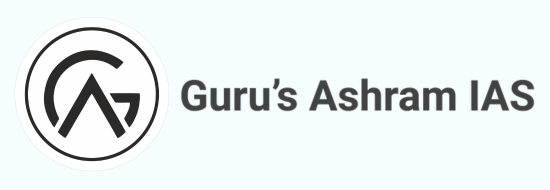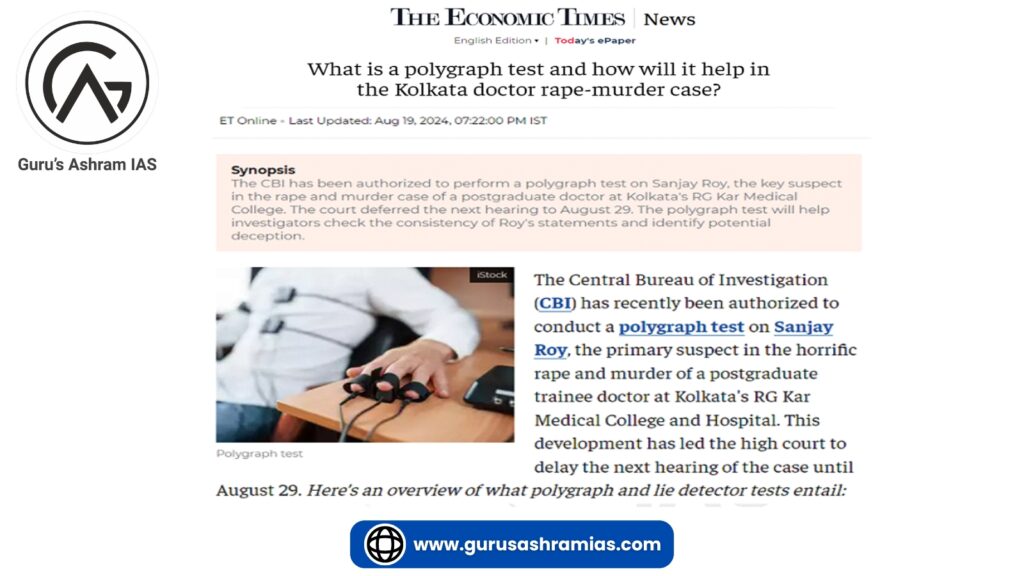Polygraph Test
- Recently, the Central Bureau of Investigation (CBI) has been authorised to conduct a polygraph test on the prime suspect in the rape and murder case of a postgraduate doctor in a Kolkata medical college.
- The polygraph test will help investigators check the consistency of the suspect’s statements and identify possible deception or deception.
Polygraph test:
- Under the process of polygraph or lie detector test, the person is asked a series of questions and when he answers them, his physiological indicators, such as blood pressure, pulse, respiration and skin conductivity, are assessed and recorded.
- This test assumes that the physical actions that occur when a person lies are different from the actions that usually occur.
- Each action is given a numerical value, so that it can be concluded whether the person is telling the truth, cheating, or being uncertain.
- A polygraph-like test was first used in the 19th century by Italian criminologist Cesare Lombroso, who used a machine to measure changes in blood pressure of criminal suspects during interrogation.
Different from narco-analysis test:
- Narco analysis test involves injecting sodium pentothal to the accused, which produces a hypnotic or unconscious state and neutralizes the alleged fantasy of the criminal suspects.
- In this state, the person becomes unable to lie and tells only the exact facts.
The accuracy of the tests:
- Polygraph and narco tests have not been scientifically proven to be 100% accurate and remain controversial in the medical field.
- Despite this, the investigating agencies have recently used these tests as an ‘easy option’ instead of torture to extract the truth from the suspects.
Note:
Brain Mapping:
- This is a test that uses imaging to study the anatomy and function of the brain. It can help doctors determine if brain function is normal and identify areas of the brain that control movement, speech, and vision.
Legal validity of the polygraph test:
Violation of Article 20 (3):
- Polygraph, narco-analysis and brain mapping tests conducted without the consent of the accused violate Article 20 (3) of the Indian Constitution, which protects the right against self-incrimination.
- This article ensures that a person accused of any offence cannot be compelled to be evidence against himself.
The need for consent:
- Since these tests involve providing potentially self-incriminating information by the accused, obtaining their consent is imperative to avoid violation of constitutional rights.
Legal and Human Rights Concerns:
- The use of narco-analysis and similar tests raises significant concerns regarding judicial integrity and human rights, particularly individual rights and freedoms.
Criticism of the Court:
- Courts have often criticised these tests as they can inflict mental torture, which violates the right to life and privacy guaranteed under Article 21 of the Constitution.
Historical decisions related to polygraph test:
Selvi v. State of Karnataka & Ors., 2010:
- The Supreme Court ruled on the validity and admissibility of narco tests establishing that involuntary administration of narco or lie detector tests is an intrusion into the “mental privacy” of an individual.
- The apex court said the narco test violates the fundamental right against self-incrimination under Article 20 (3) of the Constitution, which states that an accused shall not be compelled to be an evidence / witness against himself for any offence.
Self-incrimination:
- Self-incrimination is a legal principle under which a person cannot be compelled to give information or testify against himself in a criminal case.
D.K. Basu v. State of West Bengal, 1997:
- The Supreme Court ruled that involuntary polygraph and narco tests would amount to cruel, inhuman and degrading treatment in the context of Article 21 or the right to life and liberty.
- In Bombay State v. Kathi Kalu Oghad, 1961, the Supreme Court of India ruled that the right against self-incrimination under Article 20 (3) of the Constitution does not extend to material evidence (such as fingerprints, handwriting, blood and voice samples), information voluntarily given, and identification procedures (such as line-ups and photo arrays).
Other observations of the Supreme Court:
- Narco tests are not reliable or conclusive as evidence because they are based on assumptions and probabilities.
- Any information or material subsequently discovered with the help of voluntarily administered test results may be admissible under Section 27 of the Evidence Act, 1872 (now the Indian Evidence Act).
- As per Section 27 of the Indian Evidence Act, 1872, information given by an accused in police custody is admissible only if it reveals any fact.
- Only that part of the information, which is directly related to the fact disclosed, whether it is a confession or not, can be proved.
- The court also emphasised that the Guidelines for Polygraph Test on Accused published by the National Human Rights Commission (NHRC) in the year 2000 should be strictly followed.
Guidelines issued by NHRC regarding Polygraph Test:
Voluntary consent:
- The accused must voluntarily consent to the polygraph test and have the option to refuse the test.
Informed consent:
- Before giving consent for the test, the accused should have complete information about its purpose, procedure and legal implications. This information should be provided by the police and the lawyer of the accused.
Recorded Consent:
- The consent of the accused for the polygraph test should be recorded before the judicial magistrate.
Documents:
- At the time of court proceedings, the police will have to produce evidence that the accused agreed to undergo a polygraph test. These documents are presented before the judge by the advocate.
Clarification of statements:
- The accused should understand that the statements given at the time of polygraph test are considered as statements given to the police and not as confessions.
Judicial Considerations:
- While considering the results of the polygraph test, the judge considers factors such as the period of custody and interrogation of the accused.




